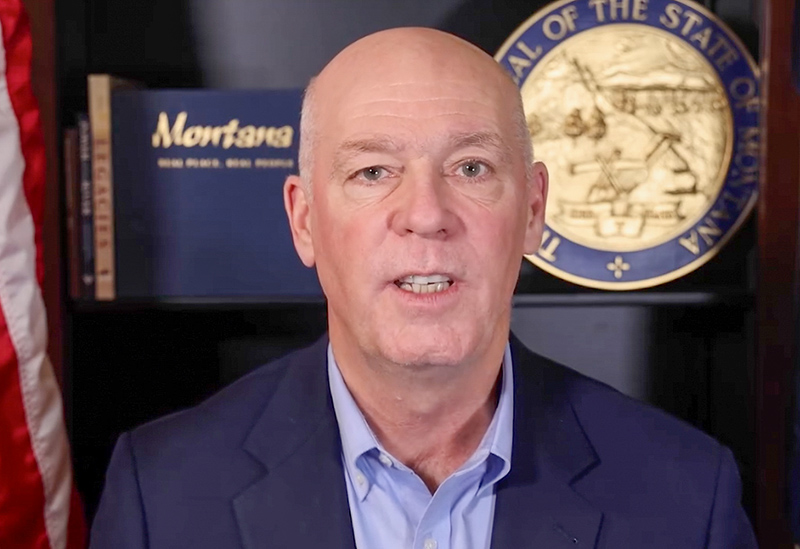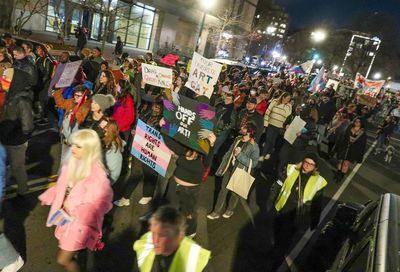Fairfax County Denounces Youngkin’s Anti-Trans “Model Policies”
Board pledges to defy proposals to roll back pro-transgender accommodations following student-led walkouts and protests.

The Fairfax County School Board has said it does not plan to adopt, nor abide by, Virginia Department of Education guidelines outlining “model policies” for dealing with transgender, nonbinary, and gender-nonconforming students in schools.
At its monthly meeting on Oct. 6, the board issued a statement, read aloud by Board Chair Rachna Sizemore Heizer — who said all board members helped in crafting the statement — that expressed its opposition to policies favored by Republican Gov. Glenn Youngkin and vowed to keep in place protections to support “our transgender and gender-expansive students, staff, and families.”
“The Fairfax County School Board understands that our LGBTQIA+ students, staff, and families are worried about the impact of Governor Youngkin’s proposed model policies for transgender and gender-expansive students,” the statement reads.
“Nearly one in five transgender and non-binary youth attempted suicide in the last year. LGBTQIA+ youth who found their school to be affirming reported lower rates of attempting suicide,” the statement continues. “It is necessary to ensure our school community is a place where all students can live without fear of prejudice, discrimination, harassment, or violence.”
The board members vowed to continue enforcing Policy 1450, which prohibits discrimination against students, faculty, and staff based on a host of characteristics, including sexual orientation and gender identity. The policy, which was first adopted in 1986 and revised in 2015 to include protections for LGBTQ individuals, states that no one shall be “excluded from participation in, be denied the benefits of, or be subjected to discrimination under any education program or activity.”
That policy also encourages faculty and staff to help combat discrimination by “engendering respect for the abilities and accomplishments of all peoples,” with culturally competent training available for teachers and administrators.
The board also pledged to keep in place a regulation that enumerates essential rights and protections for transgender, gender-nonconforming, and nonbinary students and respects those students’ right to privacy without “outing” them to other school staff, except on a need-to-know basis. It was unanimously adopted by the board in July, prior to the Department of Education’s latest guidance.
Under that regulation, which deals with issues ranging from use of preferred names and pronouns to the facilities that trans students may access, schools are directed to “accept a student or parent’s assertion of a student’s gender-expansive or transgender status.” A support team can be convened to assist with accommodating transgender or gender-nonconforming students’ needs and develop a support plan that protects a student’s privacy and minimizes stigma as much as possible.
The board has also pledged to abide by the Virginia Human Rights Act, which prohibits discrimination based on a person’s sexual orientation and gender identity, as well as by Title IX’s prohibitions on sex-based discrimination, and the 4th U.S. Circuit Court of Appeals’ ruling in Grimm v. Gloucester County School Board, which found that limiting trans students to using only facilities matching their assigned sex at birth was discriminatory.
“Protecting, supporting, and affirming our transgender and gender-expansive students is critical to achieving a safe and respectful learning environment for all students, and providing them with equal access to educational programs, services, and activities,” the board’s statement reads. “The work to do so in a holistically inclusive way continues, but we know that, from this commitment, we will not waver.”
Fairfax County’s declaration follows similar actions by Alexandria City Public Schools and Richmond City Public Schools opposing the new “model policies,” which seek to supplant pro-transgender policies approved under the administration of former Gov. Ralph Northam.
While supporters of the new policies, including Youngkin and Attorney General Jason Miyares, have balked at the idea of defying VDOE guidelines, pro-LGBTQ advocates note that more conservative jurisdictions in the state, such as Hanover County, refused to adopt VDOE’s transgender-friendly 2021 model policies based on ideological grounds.
They argue Fairfax County Public Schools and other liberal jurisdictions are well within their rights to adopt their own policies that differ from state guidelines.
The statement followed walkouts last month by thousands of students in schools across the commonwealth in protest of the proposed VDOE policies, which are currently in the middle of a public comment period that ends on Oct. 26.
While the bulk of comments received thus far have expressed opposition to the policy, LGBTQ advocates are skeptical that any changes — even minor edits — will be made to the policies before they are adopted by the department, which is now being run by Superintendent of Public Instruction Jillian Balow, a Youngkin appointee.
Under the new model policies, schools are directed not to acknowledge transgender students’ gender identity and to treat them according to their assigned sex at birth unless they present legal documentation proving that their name or gender has been legally changed.
Even those who meet such a requirement will be barred from facilities matching their gender identity and teachers and fellow students will be allowed to deliberately misgender the students. The policy also forces school administrators to “out” any students questioning their gender or sexual orientation to parents.
No lawsuits have been filed against the proposed policies thus far, though some more liberal jurisdictions have questioned the legality of some of the policies’ provisions, noting that the prohibition on restroom use, for instance, flies in the face of the 4th Circuit’s ruling in the Grimm case, which is now legal precedent in Virginia.
Prior to the school board meeting, the LGBTQ advocacy group FCPS Pride led a protest in front of Luther Jackson Middle School, where the school board meeting was held.
“Our local people need to hear us. the state needs to hear us,” Robert Rigby, the co-president of FCPS Pride, told D.C.-area ABC affiliate WJLA. “They need to know that parents, students, and teachers and the community value transgender and gender-expansive students.”
But social conservatives say the Youngkin-preferred policies are necessary to preserving parents’ rights to be informed of decisions involving their children, and ensuring the safety and privacy of cisgender students.
In response to a request for comment, Youngkin spokesperson Macaulay Porter told the Tysons Reporter, “Children belong to families, not bureaucrats and school board members.”
Referencing the 2021 gubernatorial election, Porter added, “Virginians spoke clearly last year and they continue to say that parents matter. Parents deserve to be involved in all critical discussions about their children. School boards should bring them into the conversation, not cut them out of it.”
Following the reading of the statement, the school board voted unanimously on a resolution, proposed by School Board Member Karl Frisch (Providence), recognizing October as “LGBTQIA+ History Month” in county schools, encouraging residents to “learn more about the many historical and contemporary contributions and experiences” of the LGBTQ community, and to “build a culture of inclusivity and equity, not only during LGBTQIA+ History Month but throughout the entire year.”
Support Metro Weekly’s Journalism
These are challenging times for news organizations. And yet it’s crucial we stay active and provide vital resources and information to both our local readers and the world. So won’t you please take a moment and consider supporting Metro Weekly with a membership? For as little as $5 a month, you can help ensure Metro Weekly magazine and MetroWeekly.com remain free, viable resources as we provide the best, most diverse, culturally-resonant LGBTQ coverage in both the D.C. region and around the world. Memberships come with exclusive perks and discounts, your own personal digital delivery of each week’s magazine (and an archive), access to our Member's Lounge when it launches this fall, and exclusive members-only items like Metro Weekly Membership Mugs and Tote Bags! Check out all our membership levels here and please join us today!
























You must be logged in to post a comment.